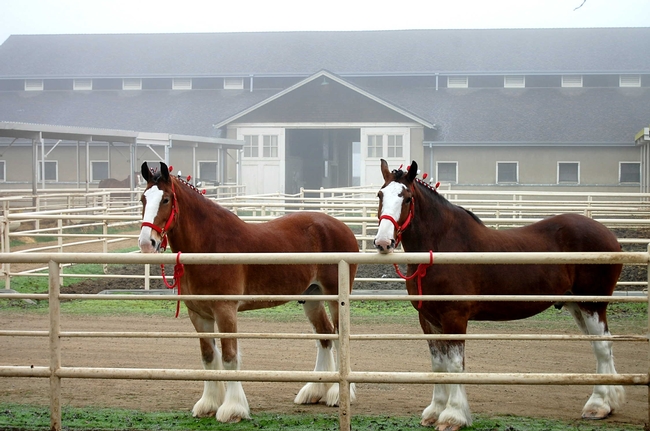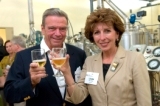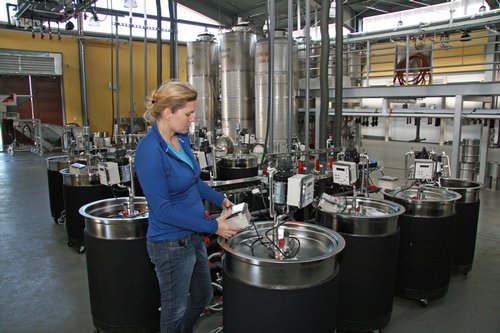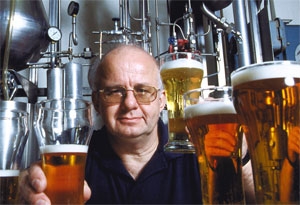Posts Tagged: beer
The fine art of spitting: Allowing underage students to taste alcohol

Not until students turn 21 can they taste the wine and beer they make and learn to assess its sensory quality. Learning the characteristics of a wide assortment of good (and not-so-good) wines and beers is an important component of winemaking and brewing. Having to wait until their junior or senior year to learn these skills is a disadvantage for these students.
Legislation (AB 1989) has been proposed by California Assemblyman Wesley Chesbro (D-North Coast) that will allow students, ages 18 to 21, enrolled in winemaking and brewery science programs to taste alcoholic beverages in qualified academic institutions. The students can taste, but not consume — which means they must learn the professional practice of spitting during the tasting process.
Professor Andrew Waterhouse, an enologist in the Department of Viticulture and Enology at UC Davis, notes that tasting is critical to the students' education.
“Winemakers taste wine daily during harvest to quickly make critical decisions as the winemaking is underway,” Waterhouse said. “Our students need to start learning this skill here, with our guidance. And, they also have to get over the embarrassment of spitting — after every taste.”
Chik Brenneman, the UC Davis winemaker, said that the bill, if passed, “will allow students to move on to the sensory program a lot sooner, before they've finished most of their winemaking classes. Earlier sensory training will help them when they go to work in the industry.”

If the legislation passes, it will benefit enology and brewing students at UC Davis, which is the only University of California campus to offer undergraduate degrees in viticulture and enology and in brewing science (an option within the food science major).
While parents of college students may worry that the bill will open the door to widespread drinking, Waterhouse and Brenneman both noted that the focus of the bill is so narrow that its impact will benefit a limited number of students, and that it's unlikely to lead to excessive drinking. They say that the over-21 students routinely spit what they're tasting in a standard industry manner, and that “drinking” in class is not a problem.
With passage of this bill, which is backed by the University of California, the state will join 12 other states that have allowed this educational exemption for students.
Read more:
- California legislative information on AB 1989
- NBC Bay Area: Reality check: Bill calls for underage tasting on college campuses, Feb. 27, 2014
- Bill by Wes Chesbro would allow underage beverage students to sip; PressDemocrat.com, Feb. 28, 2014
Is beer sacred? One man thinks of it that way
On a recent Sunday night I went to see Charles Bamforth, the University of California's only professor of brewing, speak at Sudwerk Riverside in Folsom, hosted by the Sacramento Chapter of the UC Davis Alumni Association. The standing-room-only banquet room had an empty seat next to a winemaker and a food scientist; a married couple who came back early from a weekend in Santa Cruz for some edutainment and local brew. Bamforth can pack ‘em in on most of his speaking venues.
Bamforth teaches in the UC Davis food science department. Brewing is fermentation science, which is a food science, and Bamforth’s book on Beer and Health is proof that beer is indeed food. He claims beer is better for health than wine — a point he loves to argue with the wine professors at the Robert Mondavi Institute of Wine and Food Science. That is where his shiny new sustainable brewery was installed by Anheuser Busch.
Bamforth’s favorite movie is, not surprisingly, “How Beer Saved the World.” You can watch it free online in 43 minutes without commercials. As he likes to point out, unlike water, almost no one gets sick from beer. “When is the last time you heard of a beer recall?” he quipped with a grin. If people are worried about illness from eating fruits or vegetables, he suggested they should wash them in beer.
Bamforth likes to share a chuckle over another bit of history. While reading the memoirs of former Chancellor Emil Mrak he learned that Mrak never got permission from the UC Regents to start the UC Davis brewing program in 1958. Maybe after the University of Wisconsin turned down the brewers association when they offered to fund the program there Mrak was wise enough not to ask permission.
As the third UC Davis brewing professor, Bamforth brought British expertise and his own comedic sensibilities. He punctuates brewing science with artful trivia on British, German and Flemish brewing traditions. It is easy to see why his general education classes on beer and brewing are the second largest on campus. (The largest is the formidable favorite, Human Sexuality, but when Playboy magazine published their higher education issue this year it was the brewing class, not sexuality, they featured.) Guest lecturers for his class include the brewing celebrities Fritz Maytag, former owner of San Francisco’s historic Anchor Steam, and Ken Grossman of Sierra Nevada Brewing.
Comedic timing aside, Bamforth also has a serious side. He handles the typical questions with ease, such as, “Why is most American beer so flavorless compared to craft brews?” (He frequently reminds us that the best selling beer is Bud Light.) He compared weather in California to England’s, and reminded us that a light beer is a thirst quencher on hot days and a better pairing for spicy Thai curry and cheesy Mexican cuisines. Bamforth says that neutral beer is more difficult to make consistently — fewer flavors to hide the defects or mask regional differences.
Bamforth’s newest book title, Beer Is Proof God Loves Us: Reaching for the Soul of Beer and Brewing, is a spoof on the Ben Franklin quote, Wine is proof God loves us. If Bamforth had his way, beer would be more revered than wine for its role in human history. He doesn’t care for silliness like beer pong or ridiculous commercials portraying drinking as one-upmanship. He teaches mindfulness and its role in responsible drinking. Drinking beer properly involves a bit of ceremony as meaningful as pouring tea. He instructs us that beer should always be poured into a perfectly clean glass, one that has not had any fingers inside on its trip to the table. There should be a foam head after the perfect pour. Maybe a whispered “Thank you, God” before the first sip would make a nice addition to the ceremony as well.
For more information:
- Courses in food science
- Interviews with Bamforth on Public Radio
- How Beer Saved the World
- UC Davis Brewing and Food Science Laboratory and Winery
- Sudwerk Riverside in Folsom

World's first LEED Platinum winery, brewery and food-processing labs

The $20 million, 34,000-square-foot teaching-and-research complex is the first winery, brewery or food-processing facility expected to earn LEED Platinum certification, the highest environmental rating awarded by the U.S. Green Building Council. It is intended to become self-sustainable in energy and water use.
Neal Van Alfen, dean of the College of Agricultural and Environmental Sciences at UC Davis, said, "It will serve as a model for industries throughout the nation that are also committed both to environmental excellence and production efficiency."
The complex houses a brewery, general foods-processing plant, milk-processing laboratory, and a teaching-and-research winery which will serve as a test bed for production processes that conserve water, energy, and other resources. The complex is adjacent to a 12-acre teaching-and-research vineyard.
Its environmentally friendly features include on-site solar power generation, a large-capacity system for capturing rainwater and conserving processing water, and many other features. The facility is expected to be carbon zero in carbon emissions.
Read more about the facility and take an online tour at the facility’s website.


A new era begins in food and beverage science

A new winery, brewery and food-processing complex began operations this fall at UC Davis. Part of the Robert Mondavi Institute for Wine and Food Science, the technologically sophisticated facilities will be used to teach students, conduct research, and solve practical problems related to foods, beverages and health.
The south wing of the new complex is home to the August A. Busch III Brewing and Food Science Laboratory, which includes the brewery, general foods-processing plant and milk-processing laboratory. The complex’s north wing houses a new teaching-and-research winery. The complex is adjacent to a 12-acre teaching-and-research vineyard and across a courtyard from the departments of Food Science and Technology, and Viticulture and Enology.
The new $20 million, 34,000-square-foot complex, funded entirely by private donations, will be the first winery, brewery and/or food-processing facility to earn LEED Platinum certification, the highest environmental rating awarded by the U.S. Green Building Council. (LEED stands for Leadership in Energy and Environmental Design.)
Features include onsite solar power generation and a system for capturing rainwater and conserving processing water. Stored rainwater will be used for landscaping and toilets.

Other features include maximum use of natural light, food-processing equipment that minimizes energy and water requirements, use of recycled glass in flooring, interior paneling recycled from a 1928 wooden aqueduct, and use of sustainably certified lumber.
The new brewery will showcase the latest in brewing technology, as well as a sophisticated laboratory for conducting research and training students. It also provides commercial brewers and suppliers with a small-scale facility to test new recipes or processes.
The general foods- and milk-processing laboratories have been built to meet state and federal food- and dairy-grade standards. Products processed there will be used in sensory and nutritional evaluations.
Research in the food-processing pilot plant will examine alternative food-processing methods and their nutritional effects, nutritional quality and shelf life of fresh-cut fruits and vegetables, nutritional enhancements from food-processing “waste” products, and improved food formulations.
The milk-processing laboratory will support research on separation of milk components into functional ingredients, processing of milk modified by different feed rations, and processing of milk from cows bred for specific characteristics.
Dozens of private donors helped make the complex a reality, including a $5 million contribution from the late winemaker, Robert Mondavi, and a $5 million pledge by the Anheuser-Busch Foundation.
Other major donations were made by Ronald and Diane Miller and by a group of winery partners led by Jess Jackson and Barbara Banke of Kendall-Jackson Wines, and Jerry Lohr of J. Lohr Vineyards & Wines. The Department of Viticulture and Enology’s Board of Visitors and Fellows also made significant contributions.
California tomato processors and growers contributed more than $2.5 million to the food-processing pilot plant. Morning Star Packing Company provided a lead gift of $1 million for the food-processing plant. Hilmar Cheese Company also stepped up with a $250,000 pledge.
In all, more than 150 individuals, alumni, corporations and foundations contributed funds for the new winery, brewery and food-processing complex.
(Thanks to Patricia Bailey, UC Davis News Service, who provided content for this post.)
Learn more at http://greenrmi.ucdavis.edu.
The skinny on beer

Why? Because most of the calories in alcoholic beverages are in the alcohol and wine typically has a higher alcohol content than beer. “The higher the alcohol content in any drink, the more calories it contains,” says Bamforth, the Anheuser-Busch Endowed Professor of Malting and Brewing Sciences.
He contends beer has gotten a bad rap about belly bloating for too long. “For years beer has been blighted by a reputation for being more fattening than other alcoholic drinks when in reality the exact opposite is true," he says. "It really irritates me when I hear the words ‘empty calories’ attached to beer. That's utter nonsense.”
In fact, beer is loaded with stuff that’s good for you. According to Bamforth, there are significant levels of some of the B vitamins in beer — folic acid, for instance — as well as minerals and fiber. “Let me tell you that beer is pretty much the richest source of silica in the diet,” he says. “Detailed studies in the United Kingdom have linked that to bone health. Beer also contains antioxidants such as ferulate.”
And then there's the alcohol itself. The majority of folks worldwide who study the link between moderate alcohol consumption and reduced risk of coronary heart disease are now convinced that the active ingredient is alcohol and not some other component of alcoholic beverages, he adds. So beer is just as effective as wine in this context.
"Now don't get me wrong. I enjoy wine,” Bamforth confides. “But I know that if I want to be genuinely intrigued by an alcoholic drink, then there is much more going on in the world of beer. There’s such a vast array of styles. Something for the depths of winter — perhaps an Imperial stout — to the balmy days of summer — a sparkling lighter lager. All enjoyed in moderation, of course.”
You would expect a professor of brewing sciences to promote ales and lagers as the drink of choice, especially on a hot summer day: “Ya'll better believe me, because beer truly is best.”
Got a question, comment, or request for more information from the beer professor? E-mail him at cwbamforth@ucdavis.edu.